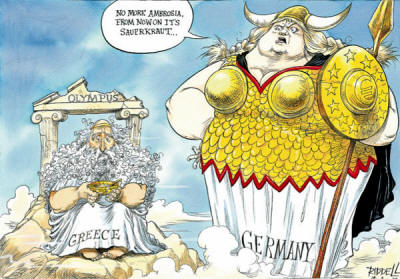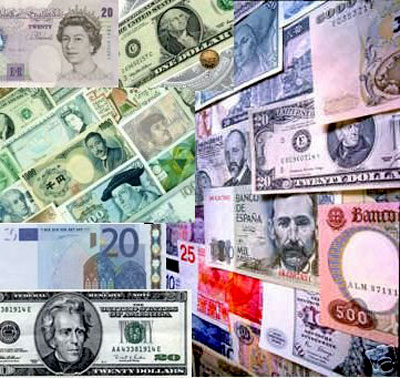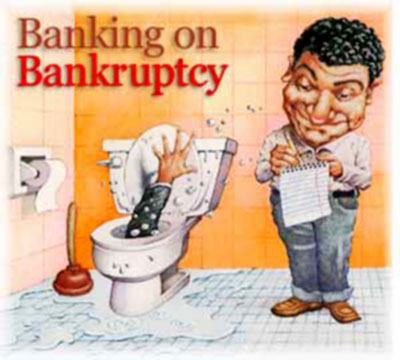
February 23, 2012
from
EconomicNoise Website

When a country is as far gone as Greece, major
changes occur, if for no other reason than the Herb Stein truism: when
things cannot continue, they won’t.
As reported by
Mish on 2/21:
As a point of curiosity, the
Greek 1-Year
Bond Yield touched 682% today, now down to a mere 666%. Bloomberg quotes
the open as 566%, if correct, the one year yield soared 116 percentage
points from the open to the high.
Greece almost certainly will leave the Eurozone.
When this occurs, a new currency will be adopted.
Whether it is called the drachma or something
else is irrelevant; it will be a new currency.
Changing Currency
A new currency provides unusual opportunities for political predation.
The initial conditions of exchange are set by
politicians, not markets. Additional legislation generally accompanies such
a change. This legislation can include forced payment of contracts in the
new currency and a host of other mandates.

Opportunities to redistribute
wealth via the initial conversion terms and the accompanying new laws make
politicians salivate.
Such events may represent the ultimate in
political theft.
Greece and Europe
This discussion will focus on Greece, although it is applicable to other
European countries that may leave the Eurozone or any other country which
issues a new currency.
If the Euro ceases to exist, every European
country would qualify. The United States is a special case, offering even
greater possibilities for political chicanery as will be discussed in a
later section.
What should the conversion rate be between the Euro and the new drachma?
Markets will eventually determine the fair rate, but that will differ from
the rate initially dictated by Greek political authorities. There are few
precedents for such transitions and room for mistakes, either deliberate or
otherwise. One advantage that Greece will have is a competing currency.
Even after the change, Euros will presumably
circulate freely within Greece.
That provides a certain amount of protection for
Greek citizens in that they can arbitrage between drachmas and Euros
(Gresham’s Law) to use the more favorable one for transactions.
The greater risk is the legislation that accompanies the new currency.
-
Will old contracts denominated in Euros
be forced to be honored in drachmas?
-
If so, will they be honored at the
original conversion rate or at the then prevailing market rate?
-
Will government dictate that its
obligations translate into drachmas at the initial conversion rate?
-
Will different contracts and classes of
citizens be treated equally?
These are all issues subject to political
shenanigans.
Regardless of how these issues are decided, the citizens of Greece are in
for a painful transition. One thing is virtually certain; the terms
established will favor those setting them - the Greek political class.
The well-being of its citizens will be a
concern, but only a secondary one.
As any government today, foremost in the
considerations will be how they can best improve their own (the
politician’s, government’s and their favored group’s) positions without
getting thrown out of office or suffering an even worse fate. That is the
modern motivation of The State, be it Greece or any other country.
The State will exploit the population to
whatever degree it can, so long as it doesn’t jeopardize its own survival.
How Does Greece Depart
The Euro?
The manner in which Greece separates from the Euro is unknown. That likely will not be for much longer as
Greece, its population and its neighbors are out of time, money and
patience.
This account, second or third-hand, purports to know how such a
departure will occur. Its validity is questionable and it is presented only
as an example of one possibility.
According to the author and a supposed document
he obtained:
The document asserts that Greece will
officially be declared in default by all the ratings agencies after the
close of business on Friday march 23rd. At the weekend all Greek bank
accounts will be frozen, with emergency measures detailed to prevent the
flight of capital.
Included in the paperwork is a list of very
limited exceptions to the ‘no withdrawals’ order. All major banks ‘are
instructed not to deal with Euro exchange as of open of business in
Greece on Monday 25th march.
All Greek markets will close for one day ‘at
least’.
I have no particular faith in this scenario, but
offer it as an example of the turmoil to come.
There will be a new currency and there will be winners and losers as a
result.
Initially, these will be determined by political decisions, not
markets.
...may soon go through a similar process of re-instituting their own sovereign currencies.
The United States May
Engineer A “Soft Default”
The United States is in a similar condition to the European nations may
choose to have a similar currency event.
Both Europe and the US have gotten to their
desperate states as a result of social welfare by stems that have run out of
control. In the US politicians have borrowed and used the printing press to
spend more than government collects and to buy votes with promises that
cannot be kept.
As a result, the US is insolvent just as Europe.

The US government is in somewhat better shape than its European counterparts
for two reasons:
-
It controls the world’s currency, the
dollar.
So long as this lasts (and it lasts only until an
alternative is found), it has more wiggle room in terms of its
extend and pretend options. The dollar will likely be a short-term
beneficiary of the disruptions in the Euro as capital flees out of
Europe into whatever is considered a safer haven.
Ultimately, the
dollar will weaken when it becomes apparent that the political class
in Washington is jeopardizing the dollar and US solvency. The US
political class has no way of solving the country’s problems.
They
have chosen to sacrifice the dollar in order to extend their time in
power.
-
Its fiscal condition is not quite as bad
(yet!). At current government spending rates, that differential is
disappearing rapidly.
Washington has demonstrated it will “print
money” in whatever quantities necessary to stave off a sovereign bankruptcy
and a Great Depression.
This strategy cannot work forever because
existing debt is already too high to be serviced.
It is only a matter of
time before the US economy succumbs. Easy money will not produce an economic
recovery, nor will it avoid another Great Depression. It is a last gasp
strategy to defer the inevitable rather than to face up to the problem(s).
If this strategy is continued, the dollar will eventually decline toward
Voltaire’s definition of fiat currency’s intrinsic value - zero. Before
that, I suspect the government will engineer a “soft default.” A soft
default is one where obligations are honored in nominal terms, but not in
real terms. It is easily done via high inflation.
I speculated elsewhere about
the issuance of a new dollar as a means to
achieve such an outcome. It is simple, quick and devastating. In such a
scenario, the US changes currency much like Greece.
Here is how such a
scenario could play out.
The US declares the old dollar null and void,
requiring all old dollars to be converted into “new dollars.” This conversion is more dangerous to US citizens
than it would be for Greek citizens for two reasons:
-
All contracts and obligations in the US
are denominated in dollars. The government could easily mandate that
all existing claims can be honored by payment in full with “new
dollars?”
-
There is no competing currency in
circulation in the US. Citizens would not be able to arbitrage
against a competing currency.
Let’s look at an example of one way this could
happen.
Government issues new dollars at the rate of 3
new for 1 old dollar. That is an immediate and massive devaluation of the
dollar. In effect, all creditors would be harmed by being paid off with
dollars now worth 33% of what was originally lent. Borrowers would benefit
to the degree that creditors lost.
Real debt would effectively be reduced by 67%.
-
Who would be the biggest beneficiary of
such a ruling? Why the US government! Further, all government
promises like social security, welfare payments, medicare, etc.
might also be deprecated.
-
Who wins again? The US government!
Is there a pattern here?
Those harmed most would be lenders. In this case, it would be anyone holding
US Treasuries like US citizens, China, Japan, etc. It would also be the US
banking system which could not survive without massive additional government
bailouts but government has already shown its propensity to do whatever is
necessary to keep the financial system alive.
Apparent beneficiaries would be consumers and the housing markets. Real
consumer debt and mortgages would be effectively reduced by 67% (as incomes
would presumably triple). Of course they would be harmed by the bailouts
necessary to make the banks whole, but many would not even see the
connection.
If such a devaluation played out as described, the government would
effectively “default” on two-thirds of its debt obligations while almost
assuredly maintaining that it was honoring them. Government would lose
credibility and be accused of bad faith by credit markets, but time would
eventually heal those concerns.
Voila! Debt problem solved, but not the
economic problem.
Inflation would at least triple, presumably raising many incomes and prices
accordingly. But price inflation is never uniform, so additional distortions
and inequities would be infused into the economy.
The strategy would not avoid a Great Depression.
It might in fact bring one on sooner as the loss of purchasing power to the
elderly (anyone dependent on fixed incomes), the poor and those on
government assistance ripples through the economy. Further, such a strategy
could trigger hyperinflation which would reduce markets to barter,
essentially guaranteeing another Great Depression.
A massive wealth transfer would have been effected away from the productive
sector toward the unproductive (government) sector.
The scenario just described might be considered unlikely, but it is exactly
the strategy government has pursued since the economic crisis. Actually it
is a strategy followed even before
the current crisis.
-
Since 1980 inflation
has stolen 80% of the dollar’s purchasing power.
-
Since the formation of
the
Federal Reserve in 1913, 96% has disappeared.
-
Since 1980, the Fed has effectively given you
new dollars for old dollars (at least in purchasing power value) at a ratio
of 4 new for 1 old.
So how far-fetched would it be for them to declare an
emergency and repeat this action only in a shorter timeframe?
It is difficult to be specific regarding a currency default/issuance of new
money in the US. The possibilities are there, easily accomplished and done
before, just in slower motion.
Two areas may provide signals that something is
about to occur:
-
Markets
Markets often force action
before it is politically desirable. Erratic movements, especially in
exchange rates, might signal the imminence of such action.
A rapidly
rising price
of gold would also likely precede such a currency event
as the ruling class and their crony friends dump the dollar in
advance and buy gold and other hard assets.
-
Politics
The political class will do
what is in their interests and what they believe they can get away
with. As sovereign bankruptcy nears, the courage to default via a
currency event increases.
What was considered politically impossible
then becomes merely unpalatable. Further, as the country devolves
further towards totalitarianism and away from the Rule of Law, those
in charge will be more emboldened to act.
The
re-election of
Obama
would seem to continue this harmful trend.
The world is headed for a debacle in financial
markets and living standards.
Both will be preceded by currency collapses. The
declines in Europe and here will trigger conditions unlike anything before
experienced on a worldwide basis. Greece is merely a small canary in a small
coal mine.
Pay attention to how this canary dies, because it may help you
survive what is coming to your personal coal mine.
Much of the above is speculation, although I think it should be considered
as possible. When government is wounded, trapped and desperate, it lashes
out like a wild animal. Survival in the political class is just as strong a
drive as it is in the wilderness. I don’t know how government will lash out,
but you are likely to
see laws, restrictions and behavior you never
imagined.
For me holding dollars and dollar-denominated assets is dangerous.
Good luck and hunker down for some unbelievable
times ahead.



